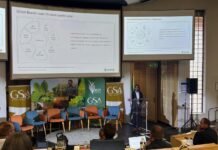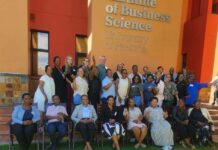South Africa’s isolated farming communities no longer cut off from the world
Today, the internet is the mechanism through which humans conduct social and economic interaction. It is also the key to accessing a world of entertainment and learning as well as being an essential business tool. Without the internet modern social interaction or even basic administration, like banking and shopping, cannot happen.
South Africa’s farmers have long been accustomed to isolation, dealing with the loneliness, insecurity and the lack of social interaction as best they can. In the country’s more remote rural areas without access to electricity the sense of social isolation and lack of meaningful human interaction is acute.
Fortunately, rapid innovations in satellite technology have made it possible – for the first time in history – for South Africa’s farmers, “to be as connected and socially active as anyone living in Johannesburg, Durban or Cape Town,” says Peter Wattrus, CEO MorClick. Gone are the days when the monthly trek to town provided the only social interaction that many farmers ever experienced.
Satellite technology is independent of terrestrial infrastructure and does not rely on a fixed electricity supply. The technology provides an affordable and reliable lifeline to off-grid agricultural operations that do not have access to fibre, are unable to finance expensive connectivity packages, or are victims of regular cable theft or collapsed local fixed-line infrastructure.
Most importantly, however, “satellite technology presents South Africa’s agricultural sector a critical social inclusion lifeline,” says Wattrus. By enabling telephone, television, Facebook, Instagram and Skype and the host of other social media elements that, today, define human interaction, satellite internet offers South Africa’s most isolated farmers, “a sense of identity and inclusion while also enabling learning, basic administration, security and commercial success,” explains Wattrus.
Beyond the social isolation challenges that South Africa’s far flung farmers face, access to the internet is also critical from a business and security perspective. Even before the COVID-19 lockdown, 60% of South African small and medium sized businesses cited affordable, stable and reliable internet as a principal obstacle to success. Under conditions of restricted movement and limited physical interaction, “Amazon and other digitally-agile businesses have shown that the ability to operate remotely – wherever you are – is a key determinant of success in a pandemic economy,” says Wattrus. While no one knows how long pandemic-related restrictions will last, even once past, “the advantages of 24/7 connectivity and always-on operability, is essential for South Africa’s remote, power-challenged farmers dealing daily with terrestrial infrastructure and security challenges,” observes Wattrus.
Access to the internet also empowers South Africa’s largely overlooked smaller commercial farming segment with the latest, “production, business, market and legislative expertise required to manage the challenges of ageing physical infrastructure, market access, financing and compliance,” says Wattrus. If South African agriculture is to meet growing domestic food needs while increasing export earnings as well as its range of beneficiated agricultural products, “it is critical that our historically isolated smaller farmer segment is empowered with the internet,” says Wattrus.
Yet even as the importance of the internet as a social and business tool grows, South Africa’s farmers increasingly face power supply, security and other basic infrastructure challenges, including cable theft and fixed-line deterioration. These challenges currently, “compromise the ability of many South African farmers to harness the power of the internet to manage social isolation or grow their businesses – at the very time that technology is emerging as the key enabler of social inclusion and higher business performance globally,” observes Wattrus. Fortunately, satellite technology, like the Ka-band technology used by MorClick, for example, is not affected by weather conditions. It also circumvents mountain ranges, buildings and other physical barriers that inhibit coverage. Moreover, since satellite internet does not need electricity or physical cables it does, “not require the installation or maintenance of the expensive physical connectivity infrastructure the cost of which has kept farmers so isolated to date,” says Wattrus.
Instead, today, satellite technology provides even the smallest and most remote agricultural businesses the insight, access and know-how to, “treat animal and crop diseases or affordably maximise yield or production while also instantly accessing national – and even international – prices, markets and offtakers,” says Wattrus. Access to the internet can also help farmers manage, “day-to-day supply and maintenance operations, educate children, upskill farm workers, and stay in touch with relatives and neighbours,” says Wattrus. This is especially important in poorly policed rural areas where satellite internet can keep farmers in touch with their immediate community 24/7 even when the power is down.
With satellite, all farmers need are a dish, a router and a subscription that best suits their personal and operational needs. Since communications satellites are already in space, “farmers don’t have to pay for one to be launched,” explains Wattrus. In the case of MorClick, installation is quick, easy and absolutely free. There are no equipment costs and, “all MorClick packages are uncapped,” he adds. MorClick’s nation-wide dealership network is also on hand to provide technical assistance and training where necessary to farmers unfamiliar with the technology or seeking guidance on how to use satellite to improve their lifestyles or operations.
During this time of increased uncertainty and heightened insecurity, the arrival of affordable satellite offers South Africa’s historically isolated farming communities an opportunity to live life as fully and meaningfully as every other South African, “unlocking the full human and business potential of, especially, South Africa’s smaller historically and geographically marginalised farmers,” says Wattrus. Satellite is also the ideal catalyst to grow a more connected – and inclusive – agricultural economy by assisting geographically and socially marginalised farmers stay connected 24/7, “increasing yield along with the effectiveness and competitivity of their reach, pricing, marketing, distribution and security,” concludes Wattrus.








